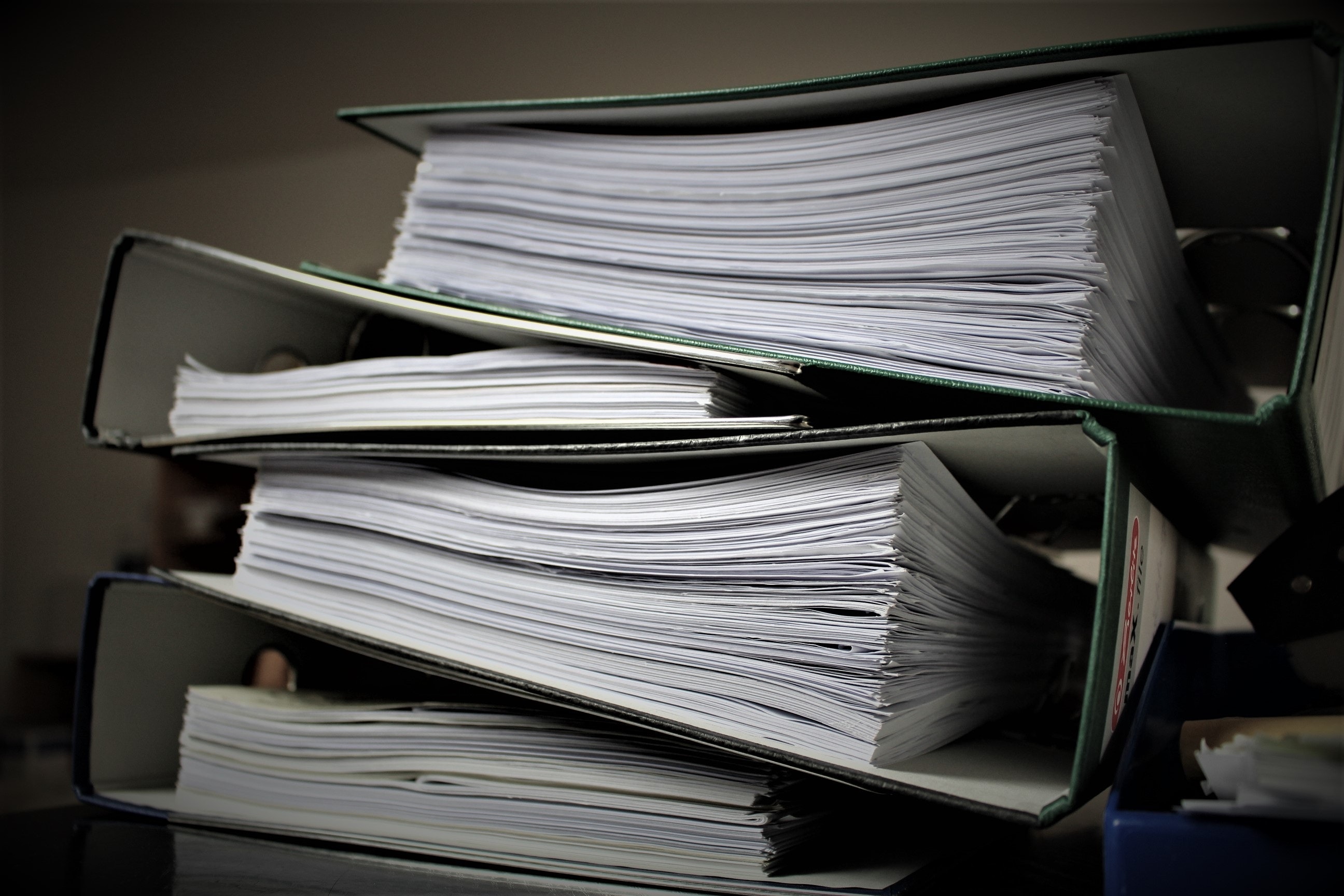Welcome to the Mineral Rights Podcast. Thank you so much for joining us. I’m your host, Matt Sands and I’m here to help you make the most of your mineral rights and royalties.
Using the embedded player above, you can download the episode to your computer or listen to it here! Be sure to also subscribe on iTunes or wherever you get your podcasts and please leave us an honest rating and review. To ask us a question to be featured on an upcoming episode, please leave a comment below or send an email to feedback@mineralrightspodcast.com.
As always, this is not meant to be legal or tax advice, but is just for informational purposes. Today we talk about what documents you should keep for your mineral rights and royalties. We provide some tips for organizing documents for minerals and royalties so be sure to listen to the end. In other words, we are talking about Document Management for Minerals and Royalties! This is not an exhaustive list of all possible documents but covers the most common that you will encounter.
What Documents Should Mineral and Royalty Owners Keep:
Division Order
Usually operators provide 2 copies, 1 for your records, 1 to sign & return. If you haven’t already, be sure to listen to Episode 16: What You Need to Know about Oil & Gas Division Orders.
Conveyance Documents
Assuming you have clear and marketable title and your minerals are in your name, you should have a deed. Keep the Original RECORDED copy of the deed or other conveyance document. Some of the most common types of conveyance documents include Mineral Deeds, Personal Representative’s Deeds, Warranty Deeds, and Quit Claim Deeds. An operator may ask you to sign a Cross-Conveyance and Stipulation of Interest document to clarify ownership when there are any ambiguities with previous conveyances when concurrent ownership (multiple people) is involved. If you have this document, keep it along with any deeds.
You can always get a certified copy from the county clerk & recorder’s office if you lose it but best to just hold on to the original.
Overriding Royalty Interest (ORRI) Assignment
Say you inherited an ORRI, this is document in an assignment document that is registered with the county clerk/recorder as well. Keep a copy of the assignment.
If you are getting paid on a particular well, keep in mind that you may also have an override in the lease itself which may cover multiple wells. If recently inherited, good idea to go back to source assignment document to see what is included and do some research on any additional wells that might be out there that you have an interest in (additional future or even permitted wells). If you look to sell, your interest may have sizable upside potential in any undrilled wells.
Keep in mind that an override is not perpetual like mineral rights but only exists while the well or lease is producing.
Non-Operated WI Assignment
Same as ORRI, through assignment or oil and gas lease. With a Non-Op WI, you will want to keep a copy of the lease. Also, retain a copy of the operating agreement which outlines specific details around the Working Interest.
With a Non-Operated Working Interest, you may be asked if you would like to participate in a well. You will receive an AFE (Authority For Expenditure) that outlines the estimated costs for work to be done (e.g. Drilling and Completing the new well).
JIB statements (Joint interest billing) which show expenses incurred along with classification of each expense for tax purposes. Operating expenses called Lease Operating Expense (LOE).
You may also want to keep any correspondence with the operator about the property.
Estate Documents
In case you inherited property in a will, keep a copy of the will that shows that you are a beneficiary to the property.
- Trust agreement – is a doc that outlines rules followed for the property held in the trust for the beneficiaries of that trust. Plus any amendments. Also, Schedule A which lists out property set aside and held in the trust.
- Certified copy of Death certificate of the person who you inherited minerals from.
- Probate docs, affidavits of heirship
If you haven’t gone through probate yet, need a copy of the deed with the person you inherited it from as the grantee (owner), or if title is still in say a grandparent’s name, then deed showing that person’s ownership.
Basically, documentation that you have that you can use to build the case that you (an any other heirs) now the rightful owners. This documentation will be necessary for probate proceedings or for a petition for determination of heirship.
Oil and Gas Leases
If there were several versions generated during lease negotiations, it is usually only necessary to keep the final version that you signed. For more on oil and gas Leasing, check out Episode 6
You will want to be able to have record of the royalty rate so if they are non-producing and a well gets drilled in the future, you can use this information along with # of NMA, size of drilling spacing unit to calculate your Net Revenue Interest to double check the DO. Check out MRP episode 16 for more info on DO’s and MRP episode 3 on how to calculate your Net Revenue Interest (NRI).
Letters from Lessee / Operator with lease terms should be retained for reference for future lease negotiations should lease be released and so you have the details around the original lease bonus amount paid and what the bonus should be if you agreed to a lease extension clause. This is so that you can confirm that you are paid right bonus amount should operator exercise that option to extend.
Check Stubs / Revenue Statements
Keep your most recent check stubs for several reasons (check with you CPA for guidance on the retention period to comply with IRS guidelines). First, you should keep these for end-of-year tax purposes, consult your CPA for more information. You should receive a 1099 that summarizes your royalties for the prior year but in the event that you don’t, your accountant will need the information on your check stubs to help determine your tax liability and any tax credits that you may qualify for.
Another reason to hold on to the revenue statements is for royalty audit purposes. By tracking these over time, you can make sure that over time the NRI is correct and that only allowed deductions are taken (e.g. if you have a cost-free lease that deductions don’t start to creep in). Listen to Episode 13: Royalty Audits and Litigation with Attorney Spencer Cox for some royalty audit tips.
Tax Documents
- 1099’s for royalties received, for lease bonus payments, etc.
- Any receipts for expenses associated with your minerals or royalties
- e.g. legal fees, accounting fees, landman fees, property tax (ad-valorem) paid
- Records associated with the sale of any minerals, including check stubs, documentation of the cost basis of the property for capital gains tax calculation
For more information on Taxes on Mineral Rights and Royalties, listen to Episode 20
In Summary
So this is the summary of the types of documents to keep. In general, keep the originals organized in some sort of file where you can readily access this information. In terms of how to do this, I like to organize files by location (by legal description, then by county) but there is no right or wrong way to organize them, just be able to access it when you need it.
Some of these documents will be required should you ever need to get an appraisal of your Minerals or Royalties. We cover move about how mineral rights are valued in Episode 4.
For any recurring documents such as 1099’s, check stubs, JIB Statements, be sure to check with your attorney and CPA for guidance on how long to retain them.
Organization Tips
If you are computer savvy, you can scan the documents and save them to your computer. Then you can organize them in a document management system of some kind (could be as simple as a file structure on your computer). Personally, if you have a Windows PC you can use OneDrive so that files are accessible locally on your computer but are then backed up to the cloud. Same concept for Mac with iCloud. That is a good place to start. Benefit of storing these online, if you use a consistent naming convention for files it is easy to search. There are many ways to get more complex with document management.
There are also a lot of online document management solutions for mineral owners that combine the master date about your property, accounting information, as well as the supporting documentation into one platform.
We will cover more in a future episode about how to do this and what some of the options out there. That’s it for now for our document management tips for mineral rights and royalty owners.
Thanks for Listening!
To share your thoughts:
- Leave a comment or question below (we read each one and your question may be featured in a future episode)!
- Ask a question or leave us feedback via email or voicemail: (720) 580-2088.
To help out the show:
- Subscribe and leave a review on iTunes or wherever you get your podcasts – we read each one and greatly appreciate it. Plus, you can get a shout out on a future episode!
Thanks again – until next time!





It was helpful when you said that you should have oil and gas leases. My grandpa was thinking about selling his rights. I’ll make sure to pass this information along to him so he can know what documents he should have.